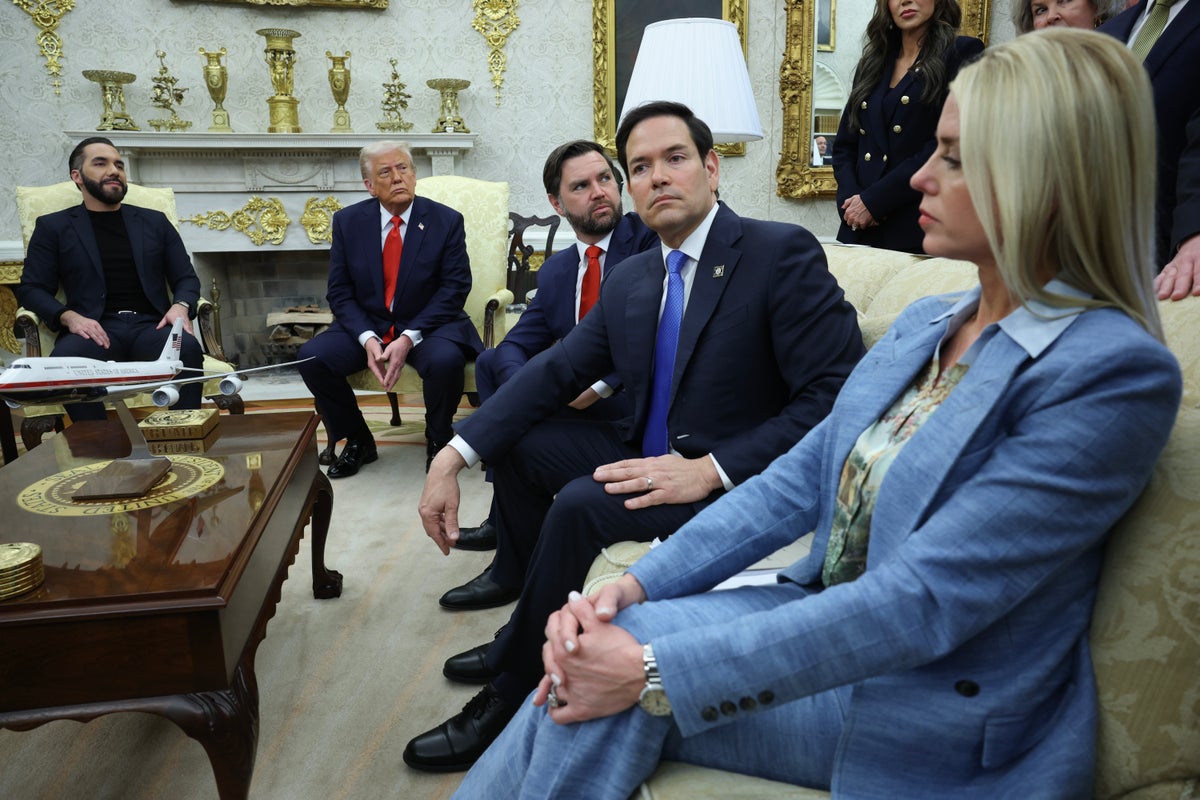
Secretary of State Marco Rubio reportedly agreed to abandon confidential informants who were protected by the U.S. government to seal a deal with El Salvador’s president, who agreed to indefinitely detain dozens of Venezuelan deportees in a brutal prison.
The arrangement, inked in the days leading up to Donald Trump’s invocation of the Alien Enemies Act to summarily deport alleged Venezuelan gang members, gave the administration access to the notorious Terrorism Confinement Center, or CECOT, decried by human rights groups as a “tropical gulag” and concentration camp that has been central to a first wave of the president’s mass deportation agenda.
On a March 13 phone call, Salvadoran President Nayib Bukele agreed to the deal, on the condition that MS-13 gang members Bukele wanted imprisoned in his jail were actually “informants” protected by the Department of Justice, according to The Washington Post.
Rather than dismissing the idea, Rubio agreed to speak with Attorney General Pam Bondi to abandon those protections, adding another layer to a secret agreement exposed in court documents and reporting in the wake of a months-long ordeal that ultimately led to a prisoner exchange and the release of 250 Venezuelans from CECOT to their home country this summer.
“Americans elected President Trump because they were tired of politicians making excuses,” State Department spokesperson Tommy Pigott said in a statement shared with The Independent.
“The Trump Administration’s results speak for themselves,” he said. “Hardened [Tren de Aragua] gang members are back in Venezuela. American hostages are home. MS-13 gang members are being prosecuted in the U.S. and El Salvador. And Americans are safer as a result of these incredible efforts.”
In his proclamation invoking the Alien Enemies Act in March, Trump stated that “all Venezuelan citizens 14 years of age or older who are members of [Tren de Aragua], are within the United States, and are not actually naturalized or lawful permanent residents of the United States are liable to be apprehended, restrained, secured, and removed as Alien Enemies.”
But government officials later admitted that “many” of those men did not have criminal records, and many were in the country with legal permission and scheduled to appear in court on their asylum claims.
A top judge in Washington, D.C. had ordered the Trump administration to turn planes around after learning in an emergency lawsuit that officials were flying the men to El Salvador. The administration resisted, provoking an extraordinary legal battle in which Trump himself demanded the judge’s impeachment.
According to The Washington Post, the White House feared that exact scenario if Venezuelans weren’t deported quickly enough.
Trump repeatedly called Rubio about the deal while the secretary was on a multiday trip to Saudi Arabia and Canada earlier this year, the newspaper reported.
While Trump sought a foreign country to facilitate his mass deportation scheme, Bukele needed support from the Justice Department to legitimize his leadership against global criticism for his threats to civil liberties, The Post noted.
Bukele appears to have held up his end of the bargain, effectively acting as a brutal pass-through for Venezuelan deportees. But only one of the nine men Bukele demanded were sent to El Salvador.
It is unclear whether they can keep up with legal battles to prevent their deportation.
But former Justice Department officials appear frustrated that the Trump administration would effectively be blowing up cases involving alleged gang members that law enforcement spent years investigating to try to win over as cooperators.
“It would be very disheartening if I worked my butt off for a year to collect that evidence … to get him into custody, to bring him to justice, just for the Department of Justice or the State Department to turn around and say, ‘OK we’re going to drop all charges,’” Daniel Brunner, a former FBI agent who worked on a joint task force investigating MS-13.
“It would gut me as a case agent,” he told The Washington Post.
After they were flown from immigration detention centers in the middle of the night to CECOT, roughly 250 Venezuelan men were shackled and gang-walked into the brutal maximum-security prison, where their heads were shaved, and then stuffed into jail cells where they lived for more than five months.
They were not allowed to speak with families or lawyers. They never stepped foot outside.
For months, government attorneys and administration officials claimed that the United States did not have jurisdiction over deportees that were locked up in El Salvador. But court filings revealed that authorities in that country told the United Nations that the “legal responsibility for these people lie exclusively” with the U.S. government.
Despite the administration’s claims that those deportees were no longer the responsibility of the United States, officials appeared to be using them as a bargaining chip in a prisoner exchange.
On July 18, following trilateral negotiations with the U.S., Salvadoran and Venezuelan governments, more than 250 Venezuelans jailed inside the facility were returned to their home country, and several Americans were returned from Venezuela’s custody to the United States.
In lawsuits and interviews following their release, the men revealed the “physical, verbal and psychological abuse” they endured, including routine beatings from guards using their fists and batons.
